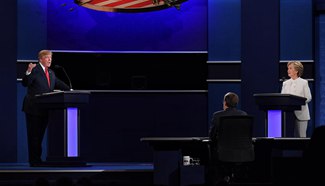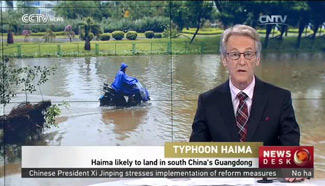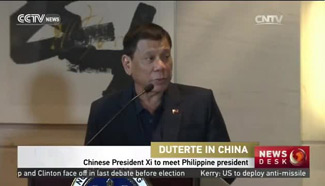by Xinhua writer Liu Chang
BEIJING, Oct. 20 (Xinhua) -- Philippine President Rodrigo Duterte is now in Beijing to warm up his country's ice-cold ties with China. The move has nothing to do with Manila's traditional alliance with Washington.
As Chinese President Xi Jinping rolled out red carpet to welcome his Philippine counterpart on Thursday morning, many around the world were predicting that the Southeast Asian nation was getting ready to pivot away from the United States, its traditional ally.
Some even said that Beijing would receive handsome gains if the Philippine-U.S. alliance truly gets weakened.h These observers are wrong although they think they have proofs as the new leader in Manila has been an open and fierce U.S. critic and threatened to cancel his country's joint military drills with U.S. armed forces.
The Chinese government never attempts to build up its ties with other countries on condition that these nations have to sacrifice their partnership with any third party.
To be more specific, the most important thing Beijing seeks to get from a sound bilateral relationship with the Philippines is that the two sides can work together to strengthen their economic and trade cooperation on the basis of mutual benefit as well as respect for each other's sovereignty and territorial integrity.
It's totally up to the Philippine authorities to decide how they are going to handle their relations with other parties, including the United States.
If America's partnership with the Philippines has indeed started to unravel, perhaps the very first thing politicians in Washington need to look into is their own way of doing business with the country they consider as a key ally in the Asia-Pacific region. And it is unfair and meaningless to scapegoat either China or Mr. Duterte.
They should also know that to sustain a partnership, they need to at least learn how to be respectful and stop being bossy.
Now that the Philippine leader is in China to fix the impaired ties, he will almost surely return home with his hands full as the two nations are expected to reach a series of agreements and step up their cooperation in areas such as fruits trade and anti-narcotics.
True friends need to be candid and honest. The visit is also a fine opportunity for the two governments to start their talks on the South China Sea dispute.
A proper handling of their maritime dispute, especially after the law-abusing arbitration episode that led bilateral ties to fall to a historical low, would build a solid foundation for the two countries to further their future cooperation without worrying that the island spats could relapse as time rolls on.










